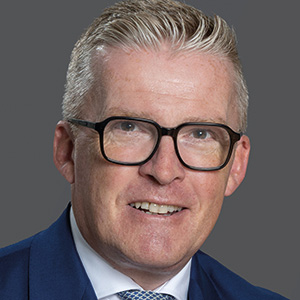Dominic Griffiths, Mayer Brown’s London managing partner, discusses bolstering the corporate practice and getting the cultural fit right
You have been London managing partner for a little over a year now. What have been your personal highlights?
Dominic Griffiths (DG): We have continued our growth trajectory over the last couple of years, in particular our revenue growth. It’s one of the fastest growing offices of Mayer Brown globally, which we’re very pleased with, of course. When I started in the role, I set out three important areas for development and one of them was high quality lateral hires. That was top of my list, and we have successfully continued that process. In the last 24 months, the London office has welcomed 11 lateral partners in key specialisations including banking and finance, private equity, investment funds and litigation and, during the course of 2022, we hired Peter Pears, a capital markets partner from Clifford Chance – he is one of the leading ESG advisers to the capital markets industry. We hired Neil Hamilton, a senior securitisation and regulatory partner, also from Clifford Chance. He is focused on providing bespoke regulatory support for our big structured finance roster of clients. We hired Matt Griffin from White & Case, the European head of its funds practice. He is an excellent, high-level, practitioner who adds to our broad scope of activity in fund formation and funds advice for our big corporate clients. We hired Airlie Goodman from Linklaters. I’ve worked with her personally, even though I’m a transactional lawyer, on a big litigation matter. She is an absolutely exceptional litigator. She fits very well in our elite litigation team. We also hired Ronan Mellon from DLA Piper. Ronan and I worked together many years ago at White & Case. It makes me feel a bit old because he was a junior lawyer then and he’s been a partner for ten years now. He has hit the ground running and he’s had some very successful transaction closings already. Last but not least, Paul Rosen from Katten Muchin Rosenman UK came over into our fast-growing private equity team.
How has the London office performed relative to your expectations?
DG: The last few months have been extraordinary times in the markets and we track those markets closely. Mayer Brown, in New York and London in particular, defines itself as being strong in financial services, with the majority of our partners and practitioners focused on this sector. It has been a very strange market. We saw a decrease in the amount of leverage being provided by banks from around September last year. We were looking very closely at credit funds because we have a lot of fantastic work with credit funds to pick up in that space, but, actually, the expectations of the market have not really been met with regard to the amount of leverage required for a really strong and active market. Notwithstanding all of that, we have a very good private equity and leveraged finance practice, which has remained strong and busy because there are more deals in that market. We’re very well hedged in relation to a market like this. We’ve got an extremely strong restructuring team, which is beginning to get really very busy over the last two or three months and we’ve also got a very large litigation group.
What are your ambitions over the next few years? Is there an area you feel needs to be invested in?
DG: My predominant focus is corporate M&A and private equity. Alongside that, there are a number of other areas which we may enhance. Our litigation team is doing incredibly well but if there’s an opportunity to enhance that further we might add one or two new partners in that area. But we feel that what we need now is to grow our corporate team to match the size and success of our finance and litigation teams.
‘We’re very good at identifying the right cultural fits in terms of people joining the firm, at the most junior level right up to the most senior partners we hire laterally.’
Dominic Griffiths, Mayer Brown
I feel very strongly that it is not just about increased profitability; it’s also about increasing personal capital. Having a really diverse strong group of lawyers and people in business services who love working in the firm. This place has an incredibly strong and healthy work culture. We concentrate on things like mental health and equality, in particular in senior roles and for women and other people with protected characteristics. My ambition in that area is not just to improve the situation of my own law firm, it is to improve the profession.
What is your elevator pitch for attracting new recruits?
DG: We’re very good at identifying the right cultural fits in terms of people joining the firm, at the most junior level right up to the most senior partners we hire laterally. It’s important to identify that. That also means hiring a good diverse group of people and making it a welcoming environment on arrival. We’ve got good levels of retention in this office. People enjoy working here, but also socialising with each other. It’s a friendly, open environment. It’s a flat structure in terms of management. Hopefully management is approachable and accessible and the partners treat their associates as adults and not as second class citizens, which can happen in our profession. It’s incredibly important to consider that we’ve got the best people in business services. Business services individuals are treated with the utmost respect and in an equal fashion to lawyers.
How has the war in Ukraine impacted the practice?
DG: We had no operations in Russia and therefore very minimal levels of exposure, in relation to the war in Ukraine. But we have seen a significant uptick in work in areas like sanctions and disruption to supply chains and disputes. So, there has obviously been a slight change in the type of work that we have been doing.
How would you define the firm’s culture?
DG: Being in the trenches together, collegiality in the face of stressful circumstances, pulling together and getting deals done, and rewarding people for it. We have a good collegiate environment where people are supportive of each other. We also have a balanced culture between the meritocratic and entrepreneurial nature of a US-centric law firm and the collegiality and traditional aspects of a traditional English law firm.
How do you think the firm’s brand is seen in the market and what would you change about that perception?
DG: We believe the market thinks of us as having very high calibre lawyers who work on some of the best mandates available in transactional work and in disputes. We’re considered to be a very reliable law firm in taking on highly complex work and getting deals over the line.
What does the firm need to do to fulfil its ambitions in London?
DG: Top-quality lateral hires and getting the message out there that we are exceptionally good at dealing with highly complex transactional and disputes work. It’s all about growing and strengthening our corporate practice. Maximising the potential we have across our network. We already work very well together on a transatlantic and international basis, but we can always do better in that respect. So, ensuring that we are doing enough in terms of working together with teams outside of London and that there’s enough cross departmental co-operation, there’s a lot of that already happening in this firm.
‘We’re considered to be a very reliable law firm in taking on highly complex work and getting deals over the line.’ Dominic Griffiths, Mayer Brown
What will working life look like in the coming years?
DG: Hopefully a workable hybrid model where we can ensure that we integrate to work on a remote basis, but also have an office space and environment which is attractive and congenial enough for people to want to come to the office more regularly than not. Ensuring that people are getting the best possible training and good personal interaction, which of course is very good for one’s mental health. Also meeting with clients, a number of whom are back in the City and are operating as they used to do. There has been an enormous uptick in the use of technology and AI. I do believe however, that while we are fully dedicated to innovation and incorporating new ways of working, our clients do expect a traditional type of professional working for them. There’s a really good opportunity to look at technology and advanced technology to lower cost and increase efficiencies in terms of productivity and delivering advice to clients. However, we need to appreciate that it is only appropriate in certain areas and there will be plenty of areas where traditional, bespoke advice would be required.
What have been the standout matters that demonstrate Mayer Brown’s strengths?
DG: Waterwheel Capital Management – our securitisation team advised on three multi-billion dollar deals in 2022, each demonstrating its prominence in innovative top securitisation mandates in the European and global markets. One was for WCM – a defining transaction in the de-risking of the revitalised Greek banking system and one of the first transactions to receive a guarantee from the Greek State under the Hellenic Asset Protection Scheme.
Beazley Catastrophe Bond – we advised Beazley following a £350m institutional placement, subscription and retail offer in November 2022 and then, in December 2022, on the launch of the world’s first cyber catastrophe bond which was defining for the market. This was led by partner Colin Scagell and his team.
VAALCO – we advised this world class energy company, which wanted to expand and facilitate greater exploration opportunities. It identified TransGlobe – which had assets in Egypt and Canada and listed in Toronto, on New York’s Nasdaq, and on London’s AIM – as its partner of choice. Led by partner Kate Ball-Dodd, the deal involved six jurisdictions across both developed and developing markets, five stock exchanges and was unparalleled in its complexity.
Interview conducted by Holly McKechnie
Subscriber Access
You must be logged in to view full premium content.
Links









